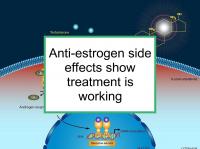Anti-estrogen treatments (endocrine treatments) are used to prevent and treat estrogen receptor positive (ER+) breast cancer. Tamoxifen interferes with a tumor's ability to use estrogen whereas aromatase inhibitors, such as Arimidex (anastrozole), Femara (letrozole), and Aromasin (exemestane), block the production of estrogen within the body.
Since the growth of ER+ breast cancer is promoted by estrogen, decreasing the availability estrogen should suppress recurrence. In fact, women who complete their anti-estrogen treatments have been found to have better recurrence and survival profiles than women who do not.
The estrogen deficiency induced by endocrine treatments can cause an increase in vasomotor (hot flashes, night sweats), genitourinary (vaginal dryness, frequent urinary tract infections, urinary incontinence, sexual dysfunction), and musculoskeletal (joint pain, fractures) symptoms, among others. These side effects cause many women not to finish their prescribed schedule of treatment. However, having these symptoms can indicate that the treatment is working and should be continued. Now a new study has reported that women who experience vasomotor, genitourinary or musculoskeletal side effects have better breast cancer outcomes than those who do not.
Latest research links certain side effects to better survival outcomes
The study referenced at the beginning of this news story was designed to investigate the relationship between specific endocrine treatment side effects (vasomotor, musculoskeletal, and vulvovaginal symptoms) and survival in postmenopausal breast cancer patients. The study included 9,325 women in the international Tamoxifen Exemestane Adjuvant Multinational (TEAM) trial. Data was collected regarding vasomotor symptoms, musculoskeletal adverse events, and vulvovaginal symptoms arising during the first year of endocrine treatment, as well as disease-free survival, overall survival, and distant metastases. Women who never started their endocrine treatment, discontinued treatment, or had a breast cancer recurrence or died within the first year were excluded from the study. Survival differences were assessed up to five years from the beginning of endocrine treatment.
Women with side effects were found to have better breast cancer-free survival and overall survival compared to those with nonspecific or no side effects. Women with vasomotor symptoms had a 27% lower risk of recurrence; those with musculoskeletal symptoms, 17% lower risk; those with vulvovaginal symptoms, 23% lower risk. Similarly, women with vasomotor, musculoskeletal or vulvovaginal symptoms had fewer distant metastases and were more likely to survive than those not reporting these symptoms. Increasing numbers of these three types of side effects were also found to be associated with better survival outcomes. On the other hand, outcomes did not vary according to type of endocrine treatment. The authors conclude that certain specific side effects are associated with superior survival outcomes and may be used to estimate treatment responses in breast cancer patients undergoing endocrine therapy.
Please see our article on the endocrine treatment for more information.
